m8u1
五下M8U1 Will you help me
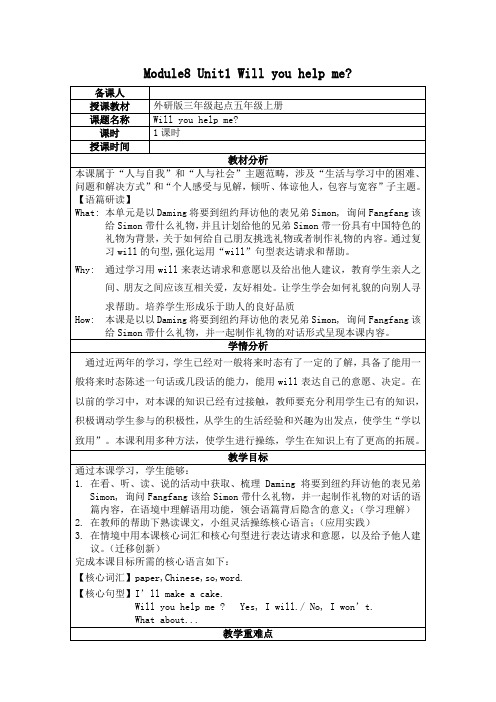
Module8 Unit1 Will you help me?
设计意图:进行多种形式操练课文,为迁移创新活动做好铺垫。
3.在情境中用本课核心词汇和核心句型进行表达请求和意愿,以及给予他人建议。
(迁移创新)Step4 Production
1.Look,ask and answer.
A: Will you...tomorrow?
B: Yes,I will.
No,I won’t.
Step5 Emotional
Before doing something, we should make a
plan.Preparedness ensures success,
while unpreparedness spells failure.
Step6 Summary
学生根据板书支架语言总结本节课内容。
教师观察学生
能否在情境中
正确运用核心
语言,适时给
予指导和帮
助、鼓励和表
扬。
设计意图:超越语篇学习,学生在迁移的语境中,创造性的使用核心语言,使学生从课本走向生活实际,实现提升学生综合素养的目的。
Homework
Say some sentences with “will”.
板书设计
Module 8 Unit 1 Will you help me?
I’ll make a kite.
Will you help me?
Yes, I will.
No, I won’t.。
外研版五上英语M8U1课件
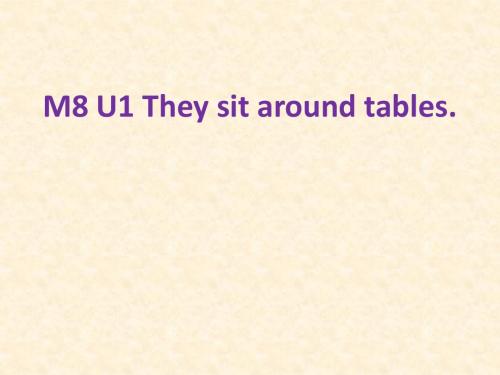
让我们随便聊聊吧。
这是写信人的地 址(address)
对收信人的称呼。 Dear Daming,
15 Marling Street London NW2 England
Yesterday , I went to Sam and Amy’s school. I took photos.
go to
take photos
M8 U1 They sit around tables.
找规律,说一说:
play go
take
plays
goes
takes
played
went took
start
finish do
starts finishes
does
started
finished did
Let’s have a free talk .
Monday , Sunny Today I went to Sam and Amy’s starts at school. Their school ________ exercises 9:00. They don’t do morning ______________ sing songs together here. They __________ every morning. They don’t sit in lines They sit ______________. _______. around tables finishes at 3:30. Their school __________
In England, the children sit around tables. We sit in lines in China. They sing songs together every morning. We do morning exercises. In England , school starts at 9 o’clock . It finishes at half past 3. In China , we start school at 8 o’clock and finish at 4 o’clock. School is fun here. But I miss my Chinese school. Love from, Lingling 这是落款,即写信人姓名
M8U1课件

present 礼物 chopsticks 筷子 windy 多风的 • visit my cousin 拜访我的表兄 • of course 当然了 what present 什么礼物 • what about = how about ……怎么样 • make a Chinese kite 做一只中国风筝 • a Chinese dragon 一条中国龙 • thank you for… 为……感谢你 • a great present 一件很棒的礼物 • Will you help me?Yes,I will. \ No,I won’t. • Will it be windy in New York?I think so.
food
Miss Chen
car
juice
cook tools
camera
handphone
…
√
×√√ຫໍສະໝຸດ ×√1.Recite the text. 2.Finish the EB.
We will have a picnic at the weekend.We should take some things. Will you take some food? Will you drive a car?Will you… 我们即将在周末进行一次野餐,我们需要带一些东西。你 会带食物吗?你打算开车吗?你打算…… (小组合作,互相用学过的句型问答,肯定 打√,否定打×)
(答一答)
1.Who is Daming going to visit? He is going to visit his cousin in America. 2.What present will Daming take? He will take a Chinese kite to his cousin. 3.Will it be windy in New York? Yes,it will. 4.Will Fanfan help Daming make the kite? Yes,she will.
外研版六下英语M8U1 Why do you have cups on your heads
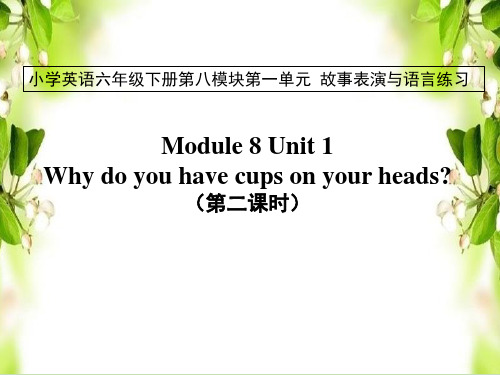
Sam: It's easy to make mistakes with English words.
Sam __sm__il_e_d. “It’s easy to make mistakes with English words,” he said. Sam opened his bag. There were baseball caps! “Hooray!” everyone _s_h_o_u_t_e_d_. They put the caps on. Then they went to the playground and played baseball together.
PLreasenntgautioange point
Why are you laughing?
why 表示“为什么”, 用来询问原因,一般要用
because…来回答.
e.g: Why are you laughing?
Because I’m happy.
课C本onso4lid6ati页on 活动四:
They planned to play a baseball game. plan to do sth.表示“ 计划干某事”
e.g:I plan to do my homework this evening.
我计划今晚做家庭作业。
LPraesnengtautioange point
It’s easy to make mistakes with English
M8U1单元重点单词短语
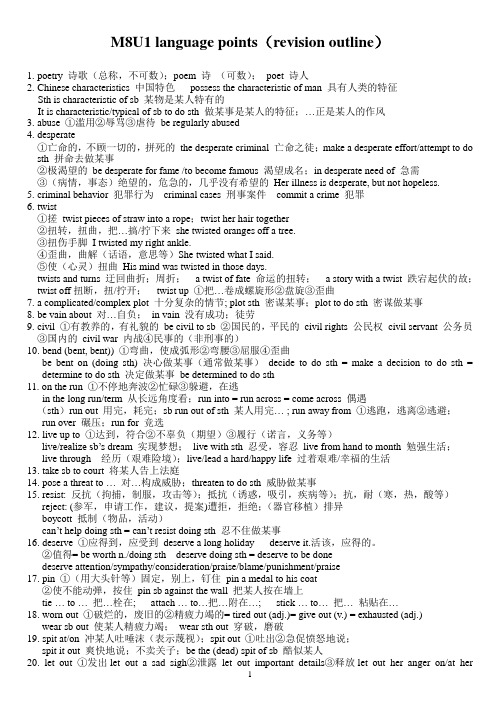
M8U1 language points(revision outline)1. poetry 诗歌(总称,不可数);poem 诗(可数);poet 诗人2. Chinese characteristics 中国特色possess the characteristic of man 具有人类的特征Sth is characteristic of sb 某物是某人特有的It is characteristic/typical of sb to do sth 做某事是某人的特征;…正是某人的作风3. abuse ①滥用②辱骂③虐待be regularly abused4. desperate①亡命的,不顾一切的,拼死的the desperate criminal 亡命之徒;make a desperate effort/attempt to do sth 拼命去做某事②极渴望的be desperate for fame /to become famous 渴望成名;in desperate need of 急需③(病情,事态)绝望的,危急的,几乎没有希望的Her illness is desperate, but not hopeless.5. criminal behavior 犯罪行为criminal cases 刑事案件commit a crime 犯罪6. twist①搓twist pieces of straw into a rope;twist her hair together②扭转,扭曲,把…搞/拧下来she twisted oranges off a tree.③扭伤手脚I twisted my right ankle.④歪曲,曲解(话语,意思等)She twisted what I said.⑤使(心灵)扭曲His mind was twisted in those days.twists and turns 迂回曲折;周折; a twist of fate 命运的扭转; a story with a twist 跌宕起伏的故;twist off扭断,扭/拧开;twist up ①把…卷成螺旋形②盘旋③歪曲7. a complicated/complex plot 十分复杂的情节; plot sth 密谋某事;plot to do sth 密谋做某事8. be vain about 对…自负;in vain 没有成功;徒劳9. civil ①有教养的,有礼貌的be civil to sb ②国民的,平民的civil rights 公民权civil servant 公务员③国内的civil war 内战④民事的(非刑事的)10. bend (bent, bent)) ①弯曲,使成弧形②弯腰③屈服④歪曲be bent on (doing sth) 决心做某事(通常做某事)decide to do sth = make a decision to do sth = determine to do sth 决定做某事be determined to do sth11. on the run ①不停地奔波②忙碌③躲避,在逃in the long run/term 从长远角度看;run into = run across = come across 偶遇(sth)run out 用完,耗完;sb run out of sth 某人用完… ; run away from ①逃跑,逃离②逃避;run over 碾压;run for 竞选12. live up to ①达到,符合②不辜负(期望)③履行(诺言,义务等)live/realize sb’s dream 实现梦想;live with sth 忍受,容忍live from hand to month 勉强生活;live through 经历(艰难险境);live/lead a hard/happy life 过着艰难/幸福的生活13. take sb to court 将某人告上法庭14. pose a threat to …对…构成威胁;threaten to do sth 威胁做某事15. resist: 反抗(拘捕,制服,攻击等);抵抗(诱惑,吸引,疾病等);抗,耐(寒,热,酸等)reject: (参军,申请工作,建议,提案)遭拒,拒绝;(器官移植)排异boycott 抵制(物品,活动)can’t help doing sth = can’t resist doing sth 忍不住做某事16. deserve ①应得到,应受到deserve a long holiday deserve it.活该,应得的。
外研版小学英语六年级下册M8U1课件

Love the world, Love our life
Complete the sentence.
eat a hamburger listen to music read a book
speak English write letters watch TV
play the trumpet clean the classroom
She was ______ born in Hubei in 1976.As a small child, she ___________ became deaf. She _________ hear or talk. When She was couldn’t 5 years old, she ________ learned to dance. She likes dancing very much. In 2005, she danced Qian Shou Guan Yin. model for us. She is a _________
lived to be 87
Let’s check!
Helen Keller was born in
.As asmall child,
she became
.She couldn’t see and she
.The teacher
couldn’t ter, Helen had a drew letters in Helen’s and .She could also
. Helen learned to . She wrote a .She lived to
book about herself. She went be 87.Helen Keller is a for us.
外研版九年级上册英语M8U1课件

P6d5ecisionkickmadmemorynoonseats
Task4
IfBetty’s(1)___m__e_m__oirsycorrect,HASwonthelas
tmatch.BIGdidnotplayverywellbecauseDamin
g_w_.aTs5hleChefceotoobmmuoptxionl.efgttmhetedahteteecaphimaswis,oaislnnlasdgtaietrwwtaiattsh(a3thb)_ea_wd_(o2_r)_d__s__i_n__nt_e_x tSaturday,soifBenttoyoanndLinglingwanttowatcht
Tony:ButDamingisbacknow.__________between
thetwoteamsthisseason.
如B果etty你:W想henisthematch? 中T午omny有e:It好’座sn位extSaturday____,But___________,youshouldco
2.Whendidyoutakepartinyourschoolsportsmeeting_______ ___l(a上stt次im)?e 3.I’msorrytosayyou’vegot___n_o_c_h_a_n_c_e(没机 会)towinthematch. 4.TomsaidmanybadwordsbehindJim,soJim________w__a_s __ ____m__a(d对w…ith…恼火)him. 5.IbelieveIwill_________b_e_a_b_l_e_to__(能)learnEnglishwellifIfi
你b来y1吗1:30,__________?
M8U1-children-often-sit-around-tablesppt课件

A
B
A 2、In England they finish school at_____?
B A
A 3、Does Lingling miss China? ____
A.Yes,she does. B.No,she doesn’t.
‹#›
True or False
1) We do morning exercises every morning in England. ( F ) 2) we sit in lines in China. ( T )
‹#›
children in the UK sit __ar_o_u_n_d_ta_b_l_es s_i_n_g__s_o_n_g_s_t_ogether every morning
children in China sit __in_l_in_e_s_
__d_o__m__o_rn__in_g__e_x_e_rc_ises every morning
We have _______ lessons in the morning and ______ lessons in the afternoon. We study ______________________and so on. ___________________________________________ ___________________________________________ ___________________________________________
‹#›
sit around tables
‹#›
in lines
‹#›
‹#›
My school life
外研版英语六年级上册M8U1-课件

Unit 1 Do you often play with dolls?
New words
很久以前 1. long ago
2.a long time ago
我很乐意
I’d love to
停止
stop
clean
camera
not really 不全是,事实上没有
show 把···给(某人)看 never 从不
I stopped a long time ago.
Often
There’s a p_ic_t_ur_e_b_o_okin this photo. I loved picture books. Do you like reading books now? Yes, of course. I often read stories.
起八
,分
静放
待手
花;
开二
。分
成
➢ Pure of heart, life is full of sweet and joy!
绩 ,
八
分
方
法
。
愿
全
天
下
所
有
父
母
我们,还在路上……
A:Do you often clean your room? B:Not very often . Do you? A:Yes, I do.
句型
Do you often …? Yes , I do. Yes, of course. Not very often.
(不经常。) Not really. (事实上不是。)
不太经常 not very often
stop(过去式) stopped take (过去式) took love (过去式) loved
M8U1教案
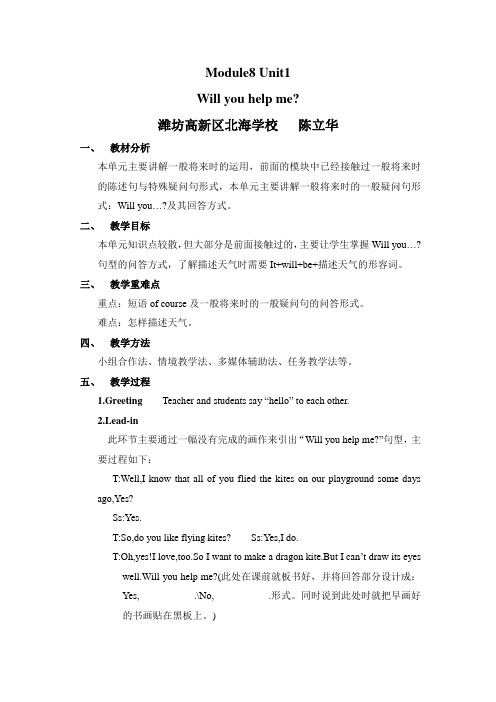
Module8 Unit1Will you help me?潍坊高新区北海学校陈立华一、教材分析本单元主要讲解一般将来时的运用,前面的模块中已经接触过一般将来时的陈述句与特殊疑问句形式,本单元主要讲解一般将来时的一般疑问句形式:Will you…?及其回答方式。
二、教学目标本单元知识点较散,但大部分是前面接触过的,主要让学生掌握Will you…?句型的问答方式,了解描述天气时需要It+will+be+描述天气的形容词。
三、教学重难点重点:短语of course及一般将来时的一般疑问句的问答形式。
难点:怎样描述天气。
四、教学方法小组合作法、情境教学法、多媒体辅助法、任务教学法等。
五、教学过程1.Greeting Teacher and students say “hello” to each other.2.Lead-in此环节主要通过一幅没有完成的画作来引出“Will you help me?”句型,主要过程如下:T:Well,I know that all of you flied the kites on our playground some days ago,Yes?Ss:Yes.T:So,do you like flying kites? Ss:Yes,I do.T:Oh,yes!I love,too.So I want to make a dragon kite.But I can’t draw its eyeswell.Will you help me?(此处在课前就板书好,并将回答部分设计成:Yes,_____ _____.\No,_____ _____.形式。
同时说到此处时就把早画好的书画贴在黑板上。
)Ss:Yes.(此处学生很有可能回答完Yes就停止,也有可能说出I will。
总之此处要引导学生说出完整的回答:Yes,I will.或者是No,I won’t.) T:Who can help me? Ss help me draw the dragon’s eyes.And then I will say:Great!It’s a cool dragon kite.I like it very much!(此处给予小组及个人双重的奖励。
四年级上英语教案-M8U1We’regoingtovisitHainan-外研社(三起)
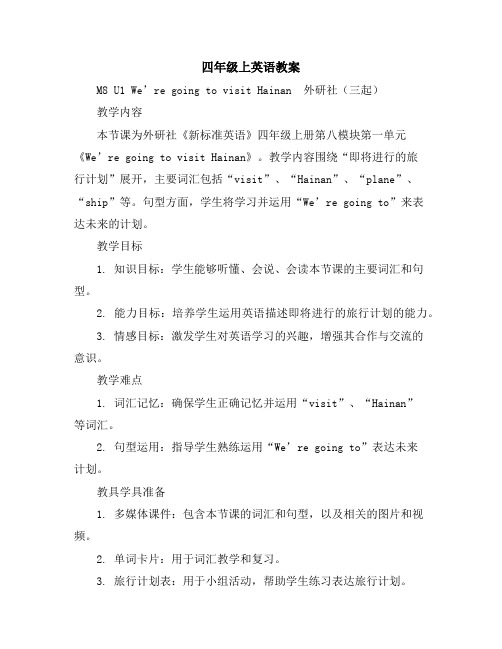
四年级上英语教案M8 U1 We’re going to visit Hainan 外研社(三起)教学内容本节课为外研社《新标准英语》四年级上册第八模块第一单元《We’re going to visit Hainan》。
教学内容围绕“即将进行的旅行计划”展开,主要词汇包括“visit”、“Hainan”、“plane”、“ship”等。
句型方面,学生将学习并运用“We’re going to”来表达未来的计划。
教学目标1. 知识目标:学生能够听懂、会说、会读本节课的主要词汇和句型。
2. 能力目标:培养学生运用英语描述即将进行的旅行计划的能力。
3. 情感目标:激发学生对英语学习的兴趣,增强其合作与交流的意识。
教学难点1. 词汇记忆:确保学生正确记忆并运用“visit”、“Hainan”等词汇。
2. 句型运用:指导学生熟练运用“We’re going to”表达未来计划。
教具学具准备1. 多媒体课件:包含本节课的词汇和句型,以及相关的图片和视频。
2. 单词卡片:用于词汇教学和复习。
3. 旅行计划表:用于小组活动,帮助学生练习表达旅行计划。
教学过程1. 课堂导入:通过展示旅行相关的图片,引起学生对本节课话题的兴趣。
2. 词汇教学:利用多媒体课件和单词卡片,教授并练习新词汇。
3. 句型练习:通过角色扮演和小组活动,让学生在实际情境中练习句型。
4. 巩固拓展:设计相关游戏和活动,巩固所学内容,并鼓励学生创造性地运用语言。
板书设计板书将包含本节课的主要词汇和句型,以及相关的示例句子。
重要词汇和句型将以不同颜色突出显示,以便学生更好地记忆和理解。
作业设计1. 书面作业:完成练习册中与本节课相关的练习题。
2. 口头作业:向家人用英语介绍自己的旅行计划。
课后反思课后反思将重点关注学生在课堂上的参与度和学习效果,以及教学方法和材料的适用性。
根据学生的反馈和学习情况,调整教学策略,以提高教学效果。
教学过程详细说明1. 课堂导入:利用多媒体展示不同旅游目的地的图片,如海滩、山脉、城市等,让学生猜测这些地方是哪里。
八年级英语上册课件(外研版):M8U1

【相关短语】pay attention注意;留心 【注意】pay attention to后若跟动词,要用动名词,而不能跟动词原形。
My mother asked me to pay attention to listening to the teacher. 我妈妈要我注意听老师讲课。
BACK
While he was cleaning the room, someone called him. 他正在打扫房间的时候,有人给他打电话。
【注意】(1)当从句中的谓语动词是延续性动词时,用when和while都可以;当从句中的谓语动词是瞬间性动词时,只能用when。
While/When I was cooking, someone knocked at the door. 我正洗衣服时,有人敲门了。 The students were drawing when the teacher came in. 当老师进来时,学生们正在画画。
hit
Be careful
Someone ___ ___his bike
fell off
Review
Read the words and expressions loudly.
new words
pale appear round corner
adj.(肤色)苍白的 v. 出现,显露 prep. 转到(某物的)另一边 n. 拐角,街角
appear attention glad hit side
glad
attention
side
appear
hit
5 Listen and mark when the speaker pauses.
1 While the lights were changing to red, a car suddenly appeared round the corner. 2 When I was waiting to cross the road, the accident happened
外研版四年级上M8U1-We-are-going-to-visit-Hainan说课讲稿
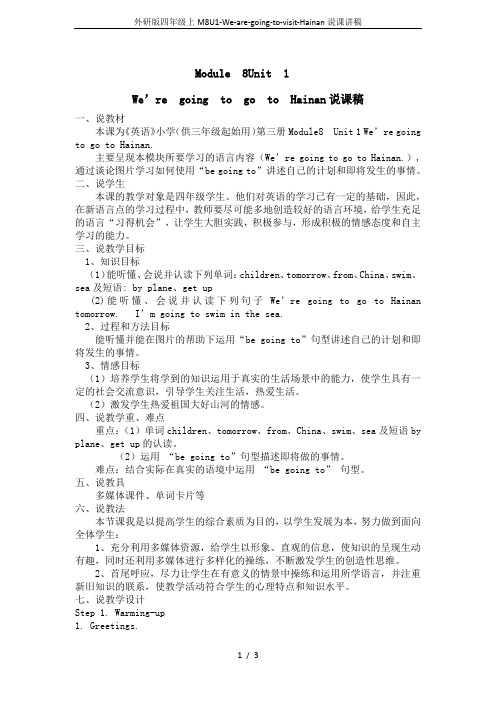
Module 8Unit 1We’re going to go to Hainan说课稿一、说教材本课为《英语》小学(供三年级起始用)第三册Module8 Unit 1 We’re going to go to Hainan.主要呈现本模块所要学习的语言内容(We’re going to go to Hainan.),通过谈论图片学习如何使用“be going to”讲述自己的计划和即将发生的事情。
二、说学生本课的教学对象是四年级学生。
他们对英语的学习已有一定的基础,因此,在新语言点的学习过程中,教师要尽可能多地创造较好的语言环境,给学生充足的语言“习得机会”,让学生大胆实践,积极参与,形成积极的情感态度和自主学习的能力。
三、说教学目标1、知识目标(1)能听懂、会说并认读下列单词:children、tomorrow、from、China、swim、sea及短语: by plane、get up(2)能听懂、会说并认读下列句子We’re going to go to Hainan tomorrow. I’m going to swim in the sea.2、过程和方法目标能听懂并能在图片的帮助下运用“be going to”句型讲述自己的计划和即将发生的事情。
3、情感目标(1)培养学生将学到的知识运用于真实的生活场景中的能力,使学生具有一定的社会交流意识,引导学生关注生活,热爱生活。
(2)激发学生热爱祖国大好山河的情感。
四、说教学重、难点重点:(1)单词children、tomorrow、from、China、swim、sea及短语by plane、get up的认读。
(2)运用“be going to”句型描述即将做的事情。
难点:结合实际在真实的语境中运用“be going to” 句型。
五、说教具多媒体课件、单词卡片等六、说教法本节课我是以提高学生的综合素质为目的,以学生发展为本,努力做到面向全体学生:1、充分利用多媒体资源,给学生以形象、直观的信息,使知识的呈现生动有趣,同时还利用多媒体进行多样化的操练,不断激发学生的创造性思维。
四年级英语下M8Unit1He lives in the east of the US教案外研版一起

学情 分析
首都及部分重要城市。 能运用看地图时的方向规律,正确读懂地图。 三、根据以上模块目标,确定本单元目标:
1.能正确认读、翻译并拼写本课词汇:speak,best, north, south, rest, country, capital,maybe,体验 ou、or 和 th 在单词中的发音规律。
A. Daming B. Sam
理 位 置 和 美 英 中 补救措施:
C. Simon
三国的首都城市。 教师进行点拨。根
①Does he live in Los
3.提问 5-6 组读课 据中文发音记忆英
Angeles?
文。
文发音,并对比中
A. Yes, he does. B. No, 4.提问 1-2 组复述 西方城市的发音规
2.词汇(包含语音): speak,best, north, south, rest, country, capital,maybe。注意 north, south 的 th,ou、or 的发音规则。归纳整理位置方位词、城市、国家、 首都、语言的词汇。 3.语法: 用方位词极其相关短语(in the east/ west / north/ south of)和一般 现在时来说明方位。 He lives in the east of the US. Los Angeles is in the west of the US. New York is in the east of the U. 4.功能:能用本节课学习的单词语法说明方位,谈论城市的位置。 二、知识结构分析: 词汇方面: 方位词:south, north east, west, in the east of..., in the west of... 国家城市: The US, The UK, New York Los Angeles Washington DC 语言:Chinese, English, Russian. 城市:New York 语法方面:She lives in ...Where’s... It’s...in the east/west of...
高二英语期末复习(M8U1)
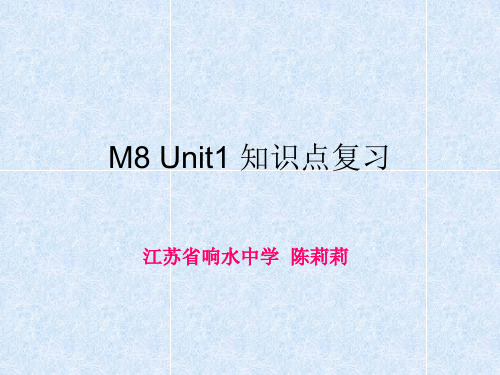
江苏省响水中学 陈莉莉
M8U1
1. the antiques of the literary world
文学世界的遗产
经典文学作品是文学世界的珍贵遗产.
Classics are the antiques of the literary world.
2. at a time 3. on stage
4. be set in 以…为背景
远大前程 以19世纪初的英格兰为背景.
Great Expectations is set in England in the early 1800s.
5. would rather do sth than do sth 宁愿做..而不愿做….
乔是个善良淳朴的人,,他宁愿死也不愿看 到皮普受到任何的伤害。
3.含蓄否定
• 含蓄否定句指的是形式上看不到否定词, 但含有一些特殊的词和词组来表示否定的 意义。如:“would rather ….than …., rather than, …too…to… ,but for , far from , free from, instead of , short of 或是 absence ,lack ,shortage 等。 • You job is far from satisfactory. • Joe would rather die than see any harm come to Pip. • He is too young to go to school.
2. nothing but =only , 仅仅 anything but … 一点也不 We can see nothing but sands. He is anything but happy . 3. out of question 没问题 out of the question 根本不可能 4. can /could not /never …too = can /could not /never ..enough 再……也不为过 You can’t be too careful when crossing the street .
外研版八上Module 8 Unit 1 教案
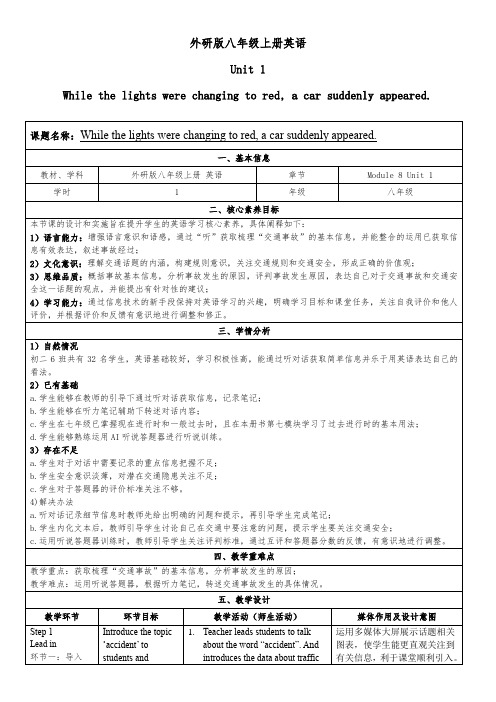
Step 3
While listening I
环节三:听中活动
Help students know about the accident from the aspect of the driver.
从对话一视角了解交通事故的基本信息。
Teacher leads students to listen to the dialogue between the policeman and the driver, get the general information first and then take notes of the details.
2.探究交通事故(Accident)的意义为线索,便于理解
本节课的主要以学生遇到的交通事故为课程线索,通过预测事故情况,关注事故发生的时间,地点,人物,结果,分析原因。引导学生一步一步了解事故的相关信息,便于学生理解和课后输出活动的展开。
3.作业设计富含学科育人理念,贴近学生自身生活,
安全教育是中学生必备的一课,作业设计为给中学生的交通安全建议,即关注了课文内容又与学生个人生活有联结。
教师引导学生通过听对话一关注交通事故的一部分信息。
运用多媒体大屏播放音频,有利于学生获取信息。
Step 3
While listening II
环节三:听中活动
Teacher leads students to listen to the dialogue between Ms James and her students.
3)思维品质:概括事故基本信息,分析事故发生的原因,评判事故发生原因,表达自己对于交通事故和交通安全这一话题的观点,并能提出有针对性的建议;
外研版八年级英语上册M8U1单元整体教学课件

6、What was the boy doing at that time?
A. Playing the phone. B. Waiting the lights C. Listening to the music.
Task B Listen and check
waiting to cross
1. Ms James saw an accident when she was
Detective: What did you see and were you doing when the accident happened? A: When the accident happened, I was walking to the toilet. B: When the accident happened, … C: … D: …
Accessment
Assessment
Content(内容) Coherence
5W+1H
(连贯)
Fluency (流畅)
Pronunciation (发音)
Homework
Take a video of your detective report, and send it to me by email.
3) Summarize the six elements of the accident and tell us the truth.
What
When
Where
Who
Why
How
Detective:A report
Hi everyone, I'm detective +name. This morning, there ... A was ห้องสมุดไป่ตู้oing .... B was ... This accident + opinions(启示, 教训)
外研版英语五年级上册m8u1笔记

外研版英语五年级上册m8u1笔记一、语言点梳理1. 单词1) cool adj. 凉爽的;酷的2) cloudy adj. 多云的3) windy adj. 有风的4) r本人ny adj. 下雨的5) snowy adj. 多雪的6) sunny adj. 晴朗的7) hot adj. 炎热的8) warm adj. 温暖的9) weather n. 天气10) season n. 季节11) spring n. 春天12) summer n. 夏天13) autumn n. 秋天14) winter n. 冬天15) umbrella n. 伞16) coat n. 外套17) hat n. 帽子18) gloves n. 手套19) scarf n. 围巾20) boots n. 靴子2. 句型1) How's the weather? 天气怎么样?2) It's cool and windy. 天气凉爽多风。
3) It's r本人ny. 天气多雨。
4) It's snowy. 天气多雪。
5) It's sunny and hot. 天气晴朗炎热。
6) I need an umbrella. 我需要一把雨伞。
7) You need a coat. 你需要一件外套。
8) She needs a hat. 她需要一顶帽子。
二、学习重点1. 天气的描述:cool, cloudy, windy, r本人ny, snowy, sunny, hot, warm等。
2. 季节的名称和特点:spring, summer, autumn, winter等。
3. 衣物的名称:umbrella, coat, hat, gloves, scarf, boots等。
4. 新句型的运用:询问天气情况和相应的应答。
三、课外拓展1. 制作一份天气预报,使用所学的词汇和句型,描述当地近期的天气情况。
- 1、下载文档前请自行甄别文档内容的完整性,平台不提供额外的编辑、内容补充、找答案等附加服务。
- 2、"仅部分预览"的文档,不可在线预览部分如存在完整性等问题,可反馈申请退款(可完整预览的文档不适用该条件!)。
- 3、如文档侵犯您的权益,请联系客服反馈,我们会尽快为您处理(人工客服工作时间:9:00-18:30)。
课题Module 8 Time off
Unit 2 We thought somebody
was moving about . 编制人徐琳审核人佐玉琴
学习目标
与
评价设计目标及要求识记理解应用
1.掌握重点单词和短语
2.能听懂听力素材,能够利用文本所学
进行简单对话。
3.激发学生对大自然的热爱,陶冶情
操,同时唤起学生的环保意识
重点难点能听懂听力素材,能够利用文本所学进行简单对话。
预习学案
学案内容学生笔记
(教师点拨)
一.短语链接
1.hardly ____
2. take up ____
3. 指出指明_______
4. Sights ____
5.在......的顶端 _________
6. 因为......而出名__________
7. be famous as __________
8. so that ______
二.听力预习
1. Listening : page 64 NO. 1
2.Listening : page 64 NO. 2
3. Listening : Lingling is taking her
friends Tony and Daming to Beihai Pa
rk. Listen and answer the questions.
(1) Where are Lingling, Tony and Damin
g?
(2) This park is famous for its lake,
_____ and the ancient _____ on the
hill. (3) Where will they have a picn
ic?
三.课本练习
4. Reading: 完成课本题目3。
要求:会读会翻
译
5. Language points.
(1) It’s so quiet here that I can h
ear the birds singing!
so... that... 意为“如此......以
致......”,用来引导结果状语从
句。
He was ___ angry ___ he couldn’
t say a word. so that 以便,使得,多
用来表示目的。
I got up early _____ _____ I could
catch the early bus.
hear sb. doing sth. 听见某人正在做某
事。
I ____ them ____ in the classroom.
(2) This park is famous for its lake,
the bridge and the ancient buildings
on the hill.
be famous for “因......而闻名/著名”相当
于
be known for He _____ _____ ____
__ his works.
be famous as 作为.......而出
名He ___ ___ ___a singer.
(3) Then I can point out the sights
of Beijing for you. point out
“指
出”Please ____ ____ the mistake
s.
point to “指向”to强调远距离;
point at “指向”at强调近距
离。
He _____ ____ the hill.!
课堂学案学生笔记
(教师点拨)【新知学习】
一、Dictation
学案内容学生笔记
【当堂巩固】
Test:. 选择填空
( )1. I often hear the boy ______
next room.
A. sing
B.
singing C. to sing ( )2. Pass me my glasses. I can __ ___ read the newspaper without them.
A. really
B. clearly
C. hardly
3. Please read the dialogue, __________ .
A. whole the class
B.
the whole class C. the all cla ss
( )4. Sorry, I have ______ homework to do . A. much too B.
too much C. too many
( )5. She asked mum ______ worry ab out me, she can look after herself.
A. don’t
B. not to
C. to not
( )6. The young man asked Mr Li __ ____ he lived.
A. where
B. that
C. if
( )7. The teacher asked me _______.
A. where do I come from
B. wh at did I like best
C. if I could speak Chinese
( )8. The city streets are full of ______.so you must be careful.
A. peoples
B. tra ffics
C. traffic
拓展
Make a dialogue in pairs or in groups.
自我反思。
